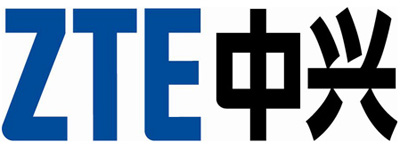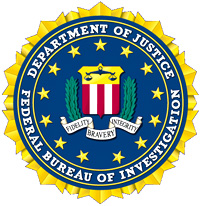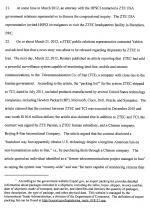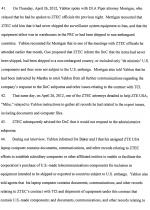FBI Targets Chinese Firm Over Iran Deal
Feds: ZTE illegally shipped U.S.-made components

View Document
JULY 12--The FBI has opened a criminal investigation targeting a leading Chinese telecommunications firm that allegedly conspired to illegally ship hardware and software purchased from U.S. tech firms to Iran’s government-controlled telecom company, a violation of several federal laws and a trade embargo imposed on the outlaw nation, The Smoking Gun has learned.
The federal probe, launched earlier this year, has also uncovered evidence that officials with the Chinese company, ZTE Corporation (ZTE), are “engaged in an ongoing attempt  to corruptly obstruct and impede” a Department of Commerce inquiry into the tainted $130 million Iranian transaction, according to a confidential FBI affidavit.
to corruptly obstruct and impede” a Department of Commerce inquiry into the tainted $130 million Iranian transaction, according to a confidential FBI affidavit.
Officials with ZTE allegedly began plotting to cover up details of the Iranian deal after Reuters reported on the transaction in late-March. The news agency revealed that the telecom equipment sold to Iran was a “powerful surveillance system capable of monitoring landline, mobile, and Internet communications.” Included in the material sent to Iran were products manufactured by U.S. firms like Microsoft, Oracle, Cisco Systems, Dell, and Symantec.
Concerned that they could no longer “hide anything” in the wake of the Reuters report, ZTE lawyers discussed shredding documents, altering records, and lying to U.S. government officials, according to an insider’s account provided to FBI agents by a Texas lawyer who last year began serving as general counsel of ZTE’s wholly owned U.S. subsidiary. ZTE, the world’s fourth largest telecom equipment manufacturer, is publicly traded, though its controlling shareholder is a Chinese state-owned enterprise.
The FBI probe is being run out of the bureau’s Dallas office by agents assigned to a counterintelligence and counterespionage squad. Like the Department of Commerce investigation (and a related congressional inquiry being conducted by the House Permanent Select Committee on Intelligence), the FBI opened its case following the March 22 Reuters story by reporter Steve Stecklow.
According to an affidavit sworn by FBI Agent Zachary Carwile, federal investigators have been provided incriminating details about the actions of ZTE officials by Ashley Kyle Yablon, a 39-year-old attorney who was hired by ZTE’s Dallas-based U.S. subsidiary in October 2011. Yablon, who previously worked as an in-house counsel for the Chinese  telecom giant Huawei Technologies, a ZTE rival, has allowed the FBI to make a forensic copy of all files on his work computer.
telecom giant Huawei Technologies, a ZTE rival, has allowed the FBI to make a forensic copy of all files on his work computer.
In a brief phone conversation, Yablon, seen at left, said that he did not have time to speak with a reporter. The attorney, who still works for ZTE, did not respond to subsequent messages left at his office and on his cell phone. Asked about his client’s role in the FBI investigation, Thomas Mills, Yablon’s lawyer, said, “I can’t talk about that topic.”
During a May 2 interview with two FBI agents, Yablon provided a startling account of his interaction with ZTE representatives who were once eager to devise strategies that would allow them to sell phones containing U.S. made components to “banned” countries. But following the Reuters story, Yablon recalled, the Chinese officials sought to obscure details of the illegal backdoor Iranian deal and, in the process, stymie U.S. government investigators circling the multinational company.
The FBI affidavit reveals that ZTE recently informed the Department of Commerce that it would not comply with an administrative subpoena served on the company seeking records of the nine-figure Iran transaction. Yablon told the FBI that he learned that ZTE officials “had contacted the PRC [People’s Republic of China] government, which was prepared to advise [the company] that if it complied with the DoC administrative subpoena, it would be violating PRC law.”
Days after the Reuters story was published, Yablon recalled, he spoke with ZTE lawyer Xue Xing Ma (also known as “Marsha”), who said the company was concerned about how the news outlet obtained a copy of the 907-page packing list for the system shipped to Telecommunication Company of Iran (TCI). “Marsha told Yablon the corporation was concerned because it could no longer ‘hide anything,’” reported Agent Carwile.
Yablon told investigators that, upon hearing this from Marsha, he responded that he would not engage in a “cover up,” and threatened to resign.
In late-March, at ZTE’s direction, Yablon retained the powerhouse law firm DLA Piper to handle the company’s response to the Department of Commerce subpoena (as well as to help prepare for a mid-April visit to ZTE’s Shenzhen headquarters by representatives of the House committee).
 In early-April, Yablon traveled to China, where he conferred with assorted ZTE officials, several company attorneys, and two DLA Piper lawyers. As recalled by Yablon, during an April 11 meeting, a ZTE lawyer identified in the FBI affidavit as “Mr. Guo” “appeared to suggest several strategies for responding to the DoC subpoena,” including claiming that the packing list obtained by Reuters was “not the real document.”
In early-April, Yablon traveled to China, where he conferred with assorted ZTE officials, several company attorneys, and two DLA Piper lawyers. As recalled by Yablon, during an April 11 meeting, a ZTE lawyer identified in the FBI affidavit as “Mr. Guo” “appeared to suggest several strategies for responding to the DoC subpoena,” including claiming that the packing list obtained by Reuters was “not the real document.”
Guo then asked Yablon and the DLA Piper attorneys what would happen if ZTE told U.S. government officials that the company “had not actually shipped the telecommunications system to Iran.” According to the FBI affidavit, Yablon replied that it appeared to him that ZTE officials were “suggesting potential scenarios that would obscure the fact that U.S.-made telecommunication equipment had been shipped to Iran.”
The day after Guo floated the cover-up trial balloon, Yablon and a DLA Piper lawyer met with two other ZTE officials, one of whom projected on a wall an image of the contract with the Iranian telecom company “for the sale of the surveillance system.” According to Yablon, “the contract essentially described how [ZTE] would evade the U.S. embargo and obtain the U.S.-manufactured components specified in the contract for delivery” to the Iranian company.
Yablon told the FBI that he believed ZTE established a separate company solely to buy “U.S.-made goods subject to the U.S. embargo,” and set up a second firm to “integrate the equipment for delivery to and installation in Iran.”
At another meeting on April 12, Yablon and DLA Piper lawyer Richard Newcomb presented ZTE officials with “a plan they had drafted for the company’s response to the DoC subpoena.” However, “none of the [ZTE] officials offered any substantive response to the plan.”
During the meeting, Yablon told the FBI, he watched as several company officials “huddled together in the corner of the room.” Yablon said that when he asked "Marsha" what  was being discussed, she answered that “they were discussing shredding documents and changing the packing list.”
was being discussed, she answered that “they were discussing shredding documents and changing the packing list.”
In late-April, Yablon noticed that he was no longer being copied on e-mail exchanges between ZTE and DLA Piper about the Commerce Department subpoena. During an April 26 conversation with John Merrigan, a DLA Piper partner, Yablon was told by Merrigan that he had spoken with ZTE officials the prior evening and that they said their firm “had never shipped the surveillance system equipment to Iran, and that the equipment either was in warehouses in the PRC or had been shipped to non-embargoed countries.”
Yablon recalled that he informed Merrigan that, weeks earlier, he had met with a ZTE lawyer who proposed a menu of possible stories to peddle to the DoC. The Chinese attorney said that U.S. investigators could either be told that telecom material had never been shipped to Iran, that the items actually went to a non-embargoed country, or that the shipment to Iran included only “de minimis” U.S. components not subject to the trade embargo.
According to Yablon, Merrigan said that a ZTE lawyer had directed him to omit Yablon from “all further communications regarding the company’s response to the DoC subpoena and other issues relating to the contract with TCI,” reported FBI Agent Carwile. Yablon, who had previously threatened to quit if asked to engage in a cover-up of the Iranian deal, appeared to have been totally frozen out by his ZTE superiors.
Merrigan, pictured below, did not respond to a phone message left at his Washington, D.C. office or an e-mail sent to his DLA Piper account.
In the last conversation recounted in the FBI affidavit, Yablon recalled speaking on April 26 with a ZTE attorney who “relayed…instructions to gather all records he had related  to the export issues, including documents and computer files.”
to the export issues, including documents and computer files.”
While the affidavit does not detail what the Chinese company planned to do with this incriminating material, ZTE certainly had no intention of providing it to U.S. authorities. In fact, the company subsequently advised DoC that they would not respond to the agency’s administrative subpoena.
Six days after being instructed to compile his work product about the Chinese firm’s deal with Iran, Yablon sat down for a lengthy interview with the FBI (it is unclear whether he reached out to the bureau). The “documents and files” Yablon was ordered to gather were stored on his laptop, an Asus model issued to him by ZTE.
On May 7, Yablon met with the FBI in his lawyer’s office and provided written consent for agents to take temporary custody of his computer so that a complete “forensic image” of the machine could be made.
Seeking to “preserve any evidence of a crime” on Yablon’s laptop, federal investigators had concluded that there was probable cause to believe that ZTE and its officers and employees had knowingly engaged in a conspiracy to illegally re-export goods to Iran, and were also involved in a “continuing and corrupt effort to obstruct and impede” U.S. government investigators. (9 pages)



















